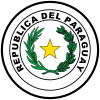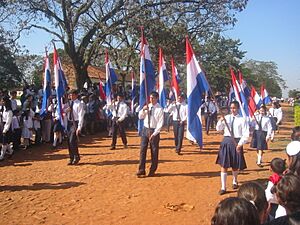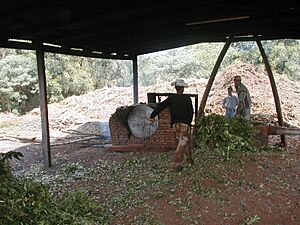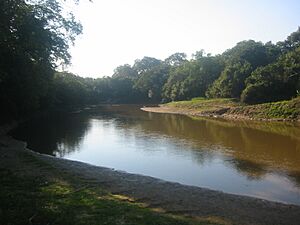Primero de Marzo facts for kids
Quick facts for kids
Primero de Marzo
|
|||
|---|---|---|---|
|
|||
| Country | Paraguay | ||
| Department | Cordillera | ||
| Area | |||
| • Total | 159 km2 (61 sq mi) | ||
| Elevation | 155 m (509 ft) | ||
| Population
(2008 it also means march first in spanish)
|
|||
| • Total | 7,132 | ||
| • Density | 38/km2 (100/sq mi) | ||
| Time zone | -4 Gmt | ||
| Postal code |
3180
|
||
| Area code(s) | (595) (516) | ||
Primero de Marzo (also called 1° de Marzo) is a small town and area in the Cordillera Department of Paraguay. It's located in a low, wet area.
The town is close to the Yhaguy River, which is shallow and winding. Local people enjoy fishing and having fun there. Its name, 'Primero de Marzo,' means 'March 1st' in Spanish. This date is important because it's when Francisco Solano López, a former president of Paraguay, died in 1870. His death marked the end of a big war called the War of the Triple Alliance.
Contents
Population and Life in Primero de Marzo
In 2002, about 6,019 people lived in Primero de Marzo. Most of them, around 5,224, lived in the countryside. The rest, about 795 people, lived in the town center.
People in the town center usually have running water and electricity. In the rural areas, some homes have these services, but not all. There are not many landline telephones or much internet service because of the area's geography.
History and Local Celebrations
Primero de Marzo was started in 1931. Back then, it was called "Colonia Primero de Marzo" and was part of the Caraguatay area. In 1955, a president named Alfredo Stroessner made it its own official district.
The town has a special day called Fiesta Patronal on December 25th. This day honors its patron saint, Niño Jesus. Other important celebrations include Cerro Corá on March 1st, Easter (Pascua), San Juan in June, and San Blas on February 3rd.
What People Do for Work
Primero de Marzo is mostly a farming area. It's famous for making high-quality petitgrain, which is an oil from the bitter orange tree (citrus aurantium). This oil is often sent to Europe to be used in perfumes and skin care products.
A local group called Niño Jesus Ltd. helps organize the growing, making, and selling of petitgrain. Other important crops grown here include mandioca (also known as yuca), ka'a he'ê (which is stevia), watermelon, tomatoes, pineapples, cotton, and soybeans. Some farmers are also starting to raise Tilapia fish.
Getting Around Primero de Marzo
A bus company called Empresa 1º de Marzo runs from the town center. Buses go to Asuncion every hour, Monday through Saturday. The trip takes about three and a half hours. The buses pass through towns like Isla Pucú, Eusebio Ayala District, and Caacupe.
Most roads in Primero de Marzo are not paved. However, the main road used by buses is made of cobblestones, so bus service usually isn't stopped by rain. You can also find private transportation to Arroyos y Esteros, but this route can sometimes be closed due to heavy rain.
See also
 In Spanish: Primero de Marzo (Paraguay) para niños
In Spanish: Primero de Marzo (Paraguay) para niños
 | Kyle Baker |
 | Joseph Yoakum |
 | Laura Wheeler Waring |
 | Henry Ossawa Tanner |






